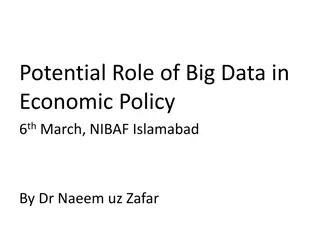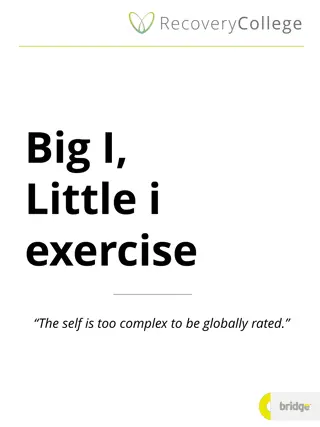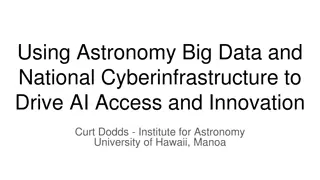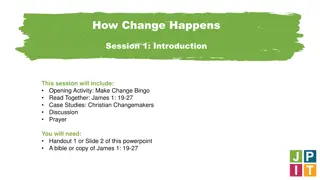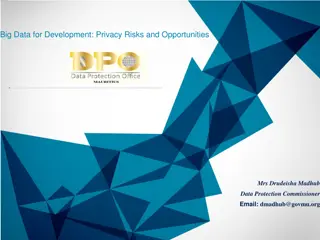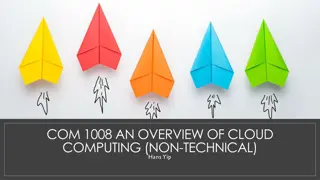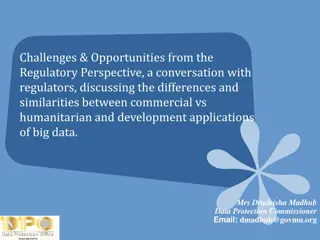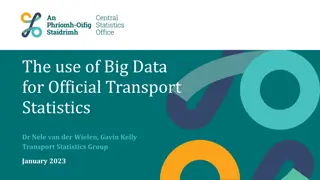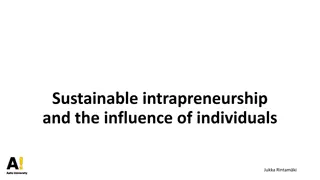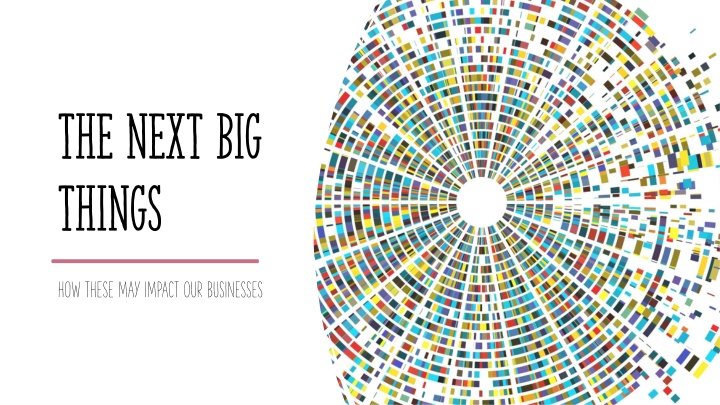
Impact of Next Big Trends on Businesses: Travel, Technology & More
Discover the upcoming trends affecting businesses, from advancements in travel like longevity, sensory experiences, and gender equality, to technological shifts with AI and automation. Explore how these trends can shape industries and drive deeper connections for improved business performance.
Download Presentation

Please find below an Image/Link to download the presentation.
The content on the website is provided AS IS for your information and personal use only. It may not be sold, licensed, or shared on other websites without obtaining consent from the author. If you encounter any issues during the download, it is possible that the publisher has removed the file from their server.
You are allowed to download the files provided on this website for personal or commercial use, subject to the condition that they are used lawfully. All files are the property of their respective owners.
The content on the website is provided AS IS for your information and personal use only. It may not be sold, licensed, or shared on other websites without obtaining consent from the author.
E N D
Presentation Transcript
THE NEXT BIG THINGS HOW THESE MAY IMPACT OUR BUSINESSES
The next big things in travel Live Forever Live Forever Longevity is the new buzzword Longevity is the new buzzword improve you lifespan and improve you lifespan and healthspan Sensory experiences Sensory experiences Dark retreats, Stopover spas in every lounge, Stopover cruises, well being spas in every lounge, Stopover cruises, well being zones on Qantas economy flights zones on Qantas economy flights Expansive east meets west therapy SHA Wellness Expansive east meets west therapy SHA Wellness (150 therapists delivering 1000 treatments) (150 therapists delivering 1000 treatments) healthspan Dark retreats, Stopover
The next big things in travel Gender equality Gender equality intrepid Travel running women s intrepid Travel running women s only tours, women led tours in Iran, A&K designing only tours, women led tours in Iran, A&K designing around the fact 85% of travel decisions are female led around the fact 85% of travel decisions are female led Climate resilience tourism Climate resilience tourism community resilience tourism tourism Agri tourism engaging with Agri tourism engaging with sustainalke farming practices farming practices Slow travel Slow travel Human rights and ethical travel Human rights and ethical travel Design based travel Design based travel community resilience sustainalke
leading with love Driving business performance through deeper connections
1. THE NEXT BIG THINGS In technological advancements
AI AND AUTOMATION Automation, AI-driven analytics, and machine learning continue to revolutionize industries. Businesses must explore how these technologies can improve efficiency, decision-making, and customer experience.
AUTOMATION AND JOB DISPLACemenT While automation enhances productivity, it also raises concerns about workforce displacement. Strategic plans should include upskilling initiatives and workforce adaptation to maintain employee engagement and operational resilience.
Digital Transformation Cloud-based solutions, the Internet of Things (IoT), and big data are reshaping how businesses operate, manage data, and engage with customers Digital platforms, e-commerce, cloud computing, and data analytics are becoming indispensable across industries Businesses must continue investing in digital technologies to optimize operations, improve customer experiences, and stay competitive.
Blockchain and decentralised Systems Beyond cryptocurrency, blockchain is becoming important for enhancing transparency, security, and trust in sectors like supply chain, finance, and healthcare. Businesses can consider blockchain for its efficiency in enabling immutable, decentralised data transactions reducing the need for intermediaries. It opens opportunities for innovation in areas like supply chain management, financial services, consumer trust making businesses more resilient and competitive in a digital-first economy
2. THE NEXT BIG THINGS In ENVIRONMENTAL SUSTAINABILITY
Sustainable practices and climate change Climate change and resource depletion are pushing businesses to adopt greener practices. Companies need to consider reducing their carbon footprints, minimizing waste, and using renewable resources Consumers, investors, and regulators are increasingly demanding businesses adopt sustainable practices. Strategic plans need to focus on reducing carbon footprints, transitioning to renewable energy, and minimizing waste to align with sustainability goals
ESG ENViRonMental, social, governance Investors and consumers are increasingly prioritising businesses with strong ESG commitments. Implementing ESG policies can boost reputation and competitiveness Incorporating ESG policies into strategic plans helps businesses build trust, improve long term sustainability, attract investors and meet growing demand for ethical and responsible practice
Climate resilience Companies must consider how climate change will impact their operations, supply chains, and business models. This includes planning for resource scarcity, regulatory compliance, and potential shifts in consumer behavior due to climate consciousness Including climate change in business planning helps companies mitigate risks, capitalise on sustainable opportunities, and ensure long term resilience in an evolving regulatory, social and environmental landscape
Circular economy The focus is shifting from linear consumption (produce, use, discard) to circular practices (reuse, repair, recycle), with regulatory pressures growing on businesses to adopt sustainable product lifecycles There s a growing market for sustainability as a service - sustainability-related services, such as carbon offsetting, energy-saving solutions, or eco-friendly alternatives. Offering these services helps businesses align with consumer demand for sustainability while driving innovation. Companies need to include the circular economy in planning decisions to reduce waste, enhance resource efficiency, lower costs, meet growing consumer and regulatory demands for sustainable, environmentally friendly business practices
3. The next big things in changing workforce dynamics
Talent access, Remote and hybrid work The pandemic has solidified remote and hybrid work as long-term models. Businesses need to invest in digital infrastructure and rethink office space utilization while maintaining employee engagement and productivity Talent Access and Geographic Flexibility will be key to the future for many businesses. With remote work, businesses can now tap into global talent pools, offering opportunities to access specialized skills while reducing costs associated with physical office locations These significant changes in human resource management are critical in all business planning
Workforce diversity, equity and inclusion Companies that embrace diverse teams and create inclusive cultures are more innovative and better positioned for future success. There is growing recognition that diverse teams lead to better performance and innovation. Companies are focusing on building diverse, inclusive cultures that attract talent from various backgrounds, emphasizing gender, race, age, and neurodiversity. Strategic planning must consider gender, ethnic, generational, and cognitive diversity
GIG economy and freelancing The rise of non-traditional employer/employee relationship (GIG workers) and freelance professionals has created a shift in employment models. Talent access and geographic flexibility is becoming a norm. With remote work, businesses can now tap into global talent pools, offering opportunities to access specialized skills while reducing costs associated with physical office locations Businesses should consider how to engage this flexible workforce while maintaining core team cohesion
4. The next big things in changing health and wellbeing priorities
health, wellness and Mental focus There s growing awareness and prioritization of mental health and well-being. Post-pandemic, there is an increased emphasis on work-life balance, leading to demand for flexible work models, shorter workweeks, and supportive environments that promote well-being Businesses must implement policies that support employee mental health, such as flexible hours, well-being programs, and resources for stress management.
Healthcare innovation The integration of digital health, health-tech, wearable technology, telemedicine, personalised healthcare, and preventive care are growing trends. Organizations need to invest in wellness programs, flexible work arrangements, and a supportive culture to retain talent and ensure productivity. If applicable, businesses can incorporate health-related innovations into their strategies
MINDFULLNESS AND WELLBEING As the focus on mental health and personal well-being increases, companies are finding ways to incorporate mindfulness practices into their cultures. Offering mindfulness programs, training products and services as part of employee well-being initiatives enhances focus and creativity while lowering stress levels. In business planning companies can foster a culture of empathy and self-awareness, improving collaboration and innovation and increasing job satisfaction
Personal resilience As the pace of technological change accelerates, there s a growing focus on helping individuals build resilience through continuous learning and personal development. Companies can integrate upskilling and reskilling programs to help their employees stay adaptable and empowered in a rapidly changing job market.
5. The next big things in Consumer behaviour shifts
11. Personalisation and hyper-targeting Consumers now expect personalized experiences tailored to their specific needs and preferences. Consumer Empowerment and meeting Expectations is key and this is driving the need for businesses to leverage data analytics and AI to deliver highly targeted marketing, product recommendations, and customer service. Businesses must leverage data to create customized offerings and foster stronger customer relationships
12. Ethical consumerism Consumers are becoming more socially conscious, opting for brands that align with their values, such as sustainability, human rights, and transparency. In planning companies should align their values and operations with the expectations of conscious consumers.
Omnichannel experiences The integration of digital and physical experiences is becoming crucial. Consumers expect seamless interactions across channels, whether online, mobile, or in-store. Businesses must focus on delivering consistent, connected experiences.
Trust and transparency Today s consumers demand more transparency regarding business practices, especially related to environmental and social responsibility. Building trust through ethical business practices and clear communication is vital for long-term success. Business should put the trust and transparency lens over all its business and strategic planning decisions
Experiential focus Consumers increasingly prefer experiences over material goods and possessions. Experience over ownership is a strong trend amongst younger generations Businesses in sectors like retail, hospitality, and entertainment can tap into this trend and must find ways to offer immersive, memorable and enriching experiences rather than just products In planning companies are increasingly including experiential marketing and immersive experiences such as pop ups, interactive digital experiences to foster emotional connections and brand loyalty
Customised and on-demand services As consumers seek more convenience and flexibility, businesses are developing on-demand services across various sectors (e.g., transportation, healthcare, or education). These services offer immediacy and flexibility, allowing businesses to cater to the "instant gratification" economy.
6. The next big things in shifting economic and political LANDSCAPe
Inflation and Supply Chain disruption Inflationary pressures and supply chain disruptions caused by geopolitical instability, such as the COVID-19 pandemic or the Ukraine conflict, mean that businesses need to focus on building resilient, flexible supply chains and managing costs.
Globalisation vs localism While globalization has driven economic growth, recent political movements toward protectionism and localism (e.g., trade wars, Brexit) require businesses to re-evaluate their international strategies, including supply chains, sourcing, and local market adaptation.
7. The next big things in Changing regulatory and compliance environments
16. DATA privacy and cybersecurity With the increasing reliance on digital platforms, ensuring compliance with data privacy regulations (like GDPR) and robust cybersecurity measures is critical for maintaining customer trust The increase in cyberattacks, ransomware, and data breaches has made it essential for businesses to adopt strong security protocols, regularly update systems, and have incident response plans in place. Cyber Resilience is a critical priority of business planning today
17. Labour regulations Shifts in labour laws around non-traditional employer/employee relationship (gig economy) workers, employee rights, and remote work are pushing companies to rethink their employment structures. Compliance in HR is a non-negotiable in planning
18. Environmental regulation As governments push for more aggressive climate policies, businesses will need to stay ahead of environmental compliance measures, potentially investing in clean technologies and processes. Environmental compliance is a non-negotiable in planning
8. The next big things in Changing in digital financial ecosystems
Fintech and digital currencies Financial technology is driving new opportunities for businesses to innovate in payment processing, lending, and financial services. The rise of cryptocurrencies and digital wallets is also something companies should consider integrating.
Decentralised finance (DeFi) DeFi and blockchain-based systems could reshape traditional financial institutions and offer new ways for businesses to access capital and manage risk
9. The next big things in LOCAL and global demographic changes
Ageing population In Australia along with many developed nations we are experiencing an ageing population, creating both challenges and opportunities in healthcare, products and services, hospitality, travel and entertainment, housing, retirement services, and labour markets
Gen z and millenials These generations demand more from brands in terms of transparency, social impact, and digital experiences. They are driving trends such as social commerce, influencer marketing, and ethical consumerism
Urbanisation and smart cities As urban areas continue to grow, opportunities in infrastructure, real estate, transportation, and technology solutions for smart cities are increasing
10. The next big things in Changing in social justice and corporate responsibility
The next big things in Changing in social justice and corporate responsibility Social Movements in respect to Diversity, Equity and Inclusion (DEI) are important and meaningful. Businesses are increasingly expected to take stances on social issues such as racial justice, gender equality, and LGBTQ+ rights. Strategic plans should reflect the company s commitment to DEI and address societal challenges in a meaningful manner Companies that proactively plan for and support these movements may find stronger loyalty among customers and employees.
COMMUNITY RESILIENCE Businesses can facilitate or participate in collaborative consumption and sharing economies where community-driven services (e.g. car-sharing, community farming, or local maker spaces) promote sustainability and shared resource models, boosting resilience through collaborative consumption. In an era of increasing global challenges like climate change and economic uncertainty, businesses are finding ways to foster community resilience by supporting local economies. This planning can mean sourcing materials locally, hiring local talent, or creating products and services that directly benefit the surrounding community.
corporate social responsibility (CSR) Beyond profit, businesses are expected to contribute to the social good. Strong CSR initiatives around community involvement, sustainability, and fair trade are becoming critical differentiators in competitive markets. Incorporating these trends into a strategic and business plan ensures that your organisation stays competitive and resilient in a rapidly changing environment. Companies that adapt early and thoughtfully to these shifts will be well-positioned for future success


